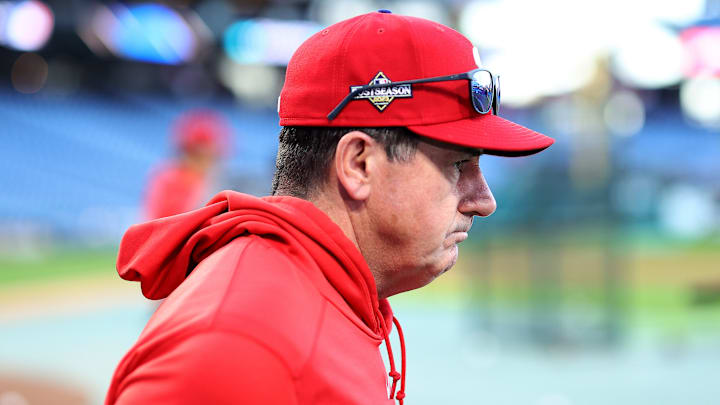In the midst of the NLCS collapse by the Philadelphia Phillies, there were some questionable calls and decisions made by manager Rob Thomson in terms of how he managed his lineup and the pitching.
How much did these decisions affect the overall outcome, and should Thomson receive all the blame as a result of the team’s failure to advance?
Game 3: Bringing in rookie Orion Kerkering in a high-leverage situation
After the Phillies managed to scratch home a run in the top half of the seventh inning to lead 1-0, Thomson brought in rookie pitcher Orion Kerkering to face the 5-6-7 hitters of the Arizona Diamondbacks lineup. Kerkering would end up cracking in the moment and promptly gave up the tying run after facing two batters.
Thomson was scrutinized for bringing in a rookie with a lack of experience into an intense, stressful situation when they had plenty of experienced options such as José Alvarado available in the pen.
Kerkering had success against the same part of the order in Game 2, so had the manager’s hunch been spot on, Kerkering could have easily put the Diamondbacks away again in Game 3. Unfortunately, the gamble didn’t pay off. In hindsight, Thomson should have gone with what was more logical in that situation rather than his gut feeling, so he should get some of the blame on this one.
Game 4: Bringing Craig Kimbrel into the game after struggling the previous night
After giving up the winning run and struggling to get hitters out in Game 3, Thomson went right back to Craig Kimbrel in Game 4. This time in the eighth inning with the Phillies up 5-3. Kimbrel gave up the game-tying home run to Alek Thomas and allowed two more runners to get on base, one of which would end up scoring the winning run for the Diamondbacks.
In this case, the blame shouldn’t be totally on Thomson.
There are often times when elite MLB closers struggle and blow a game, but they come back again the next time and are dominant. If every time a closer struggled one game, and they quickly lost their chance to close the next time, there wouldn’t be any dominant star closers in the game as a result.
In this case, Kimbrel has an elite track record of being one of the best in the game, so there’s nothing wrong with Thomson going back to Kimbrel to give him a chance to redeem himself the very next night.
NEXT: Thomson's crucial decisions in Games 6 and 7
